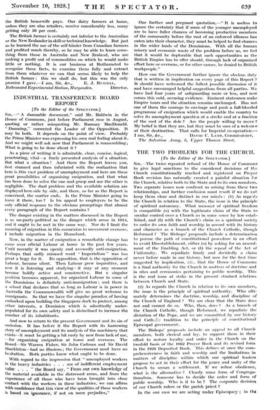INDUSTRIAL TRANSFERENCE BOARD REPORT
- [To the Editor of the SPECTATOR.]
Sin,—" A damnable document," said Mr. Baldwin in the House of Commons, just before Parliament .rose in August, quoting or rather misquoting Mr. Ramsay MacDonald. " Damning," corrected the Leader of the Opposition. It may be both. It depends on the point of view. Probably the Prime Minister was expressing his own real feeling about it. And we might well ask now that Parliament is reassembling: What is going to be done about it ?
As a piece of writing it is admirable, clear, concise, logical,
penetrating, vital—a finely presented analysis of a situation. But what a situation ! And there the Report leaves you, first stunned and then infuriated with the realization that here is this vast problem of unemployment and here are these great possibilities of organizing emigration, and that what has been done to solve the one and grasp and use the other is negligible. The dual problem and the available solution are displayed here side by side, and there, so far as the Report is concerned, the matter ends: Is the -Prime Minister going to leave it there, too ? Is his appeal to employers to be the only official response to the obvious promptings that almost every paragraph of the Report contains ?
The danger existing in the matters discussed in the Report is as un-party-political as the danger which arose in 1914, and it ought to be met in the same way. Nor do I limit the meaning of migration in this connexion to movement overseas. I include migration in the Homeland.
Now, in the matter of emigration a remarkable change has come over official Labour at home in the past few years. Until recently it was openly and avowedly anti-emigration. Perhaps that sadly misused word " Imperialism " was too great a bogy for it. Its opposition, that is the opposition of Labour, became silent. Then Labour grew inquisitive, and now it is listening and studying—it may at any moment become boldly active and constructive. But a singular Position becomes apparent, for organized Labour in some of the Dominions is definitely anti-immigration ; and there is a school that declares that so long as Labour is in power in Australia the Commonwealth will give no great welcome to immigrants. So that we have the singular paradox of having embarked upon building the Singapore dock to protect, among other interests, a Dominion which is admittedly under- Populated for its own safety and is disinclined to increase the number of its inhabitants.
And now to return to the present Government and its sin of omission. It has before it. the Report with its harrowing story of unemployment and its analysis of the machinery that exists—it must be getting a bit rusty by now from lack of use, —for organizing emigration at home and overseas. The Board—Sir Warren Fisher, Sir John Cadman and Sir David Shackleton—had no illusions ; the Government need have no hesitation. Both parties know what ought to be done.
With regard to the impression that "unemployed workers in the heavy industries . . . are of indifferent employment
value . . . "the Board say, "From our own knowledge of the material available in the distressed areas, and from the experience of all those who have been brought into close contact with the workers in these industries, we can affirm with confidence that this view of the qualities of these workers is based on ignorance, if not on mere prejudice."
One further and pregnant quotation,—" It is useless to ignore the certainty that if some of the younger unemployed are to have fuller chances of becoming productive members of the community before the rust of an enforced idleness has eaten into their character, they must be helped to find chances in the wider lands of the Dominions. With all the human misery and economic waste of the problem before us, we feel that it would be deplorable that such opportunities as the British Empire has to offer should, through lack of organized effort here or overseas, or for other causes, be denied to British workpeople."
How can the Government further ignore the obvious duty that is written in implication on every page of this Report ? It should have welcomed the fullest possible discussion of it and have encouraged helpful suggestions from all parties. We have had four years of safeguarding more or less, and now comes this cold, accusing evidence. Eminent statesmen make Empire tours and the situation remains unchanged. Has not one of them the courage to envisage and push a full-blooded programme of emigration which would enable the country to solve its unemployment question at a stroke and at a fraction of the cost of the dole ? Are the people willing to move ? My belief is that they are, but they must be sure of a wekonce at their destination. That calls for Imperial co-operation.—












































 Previous page
Previous page